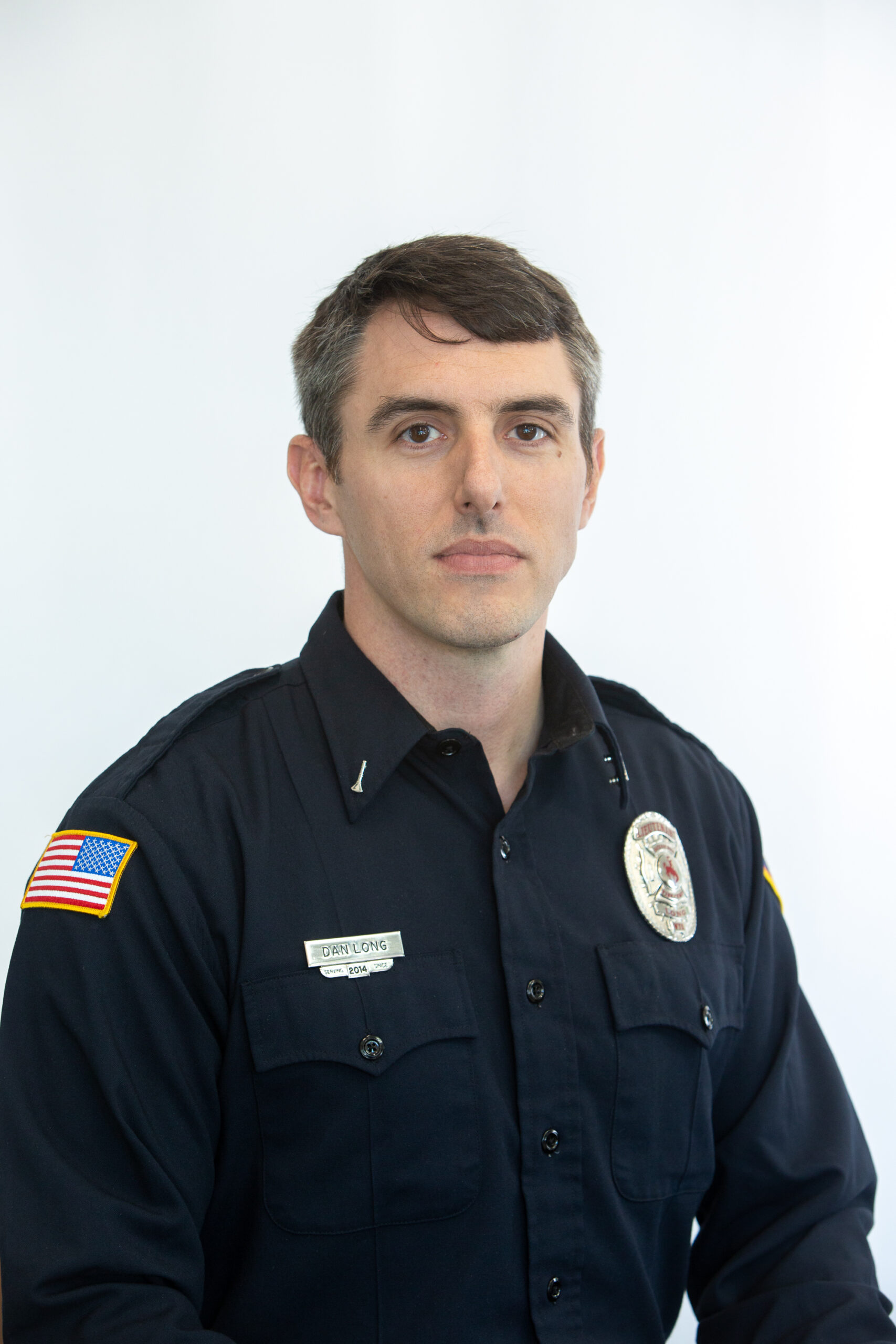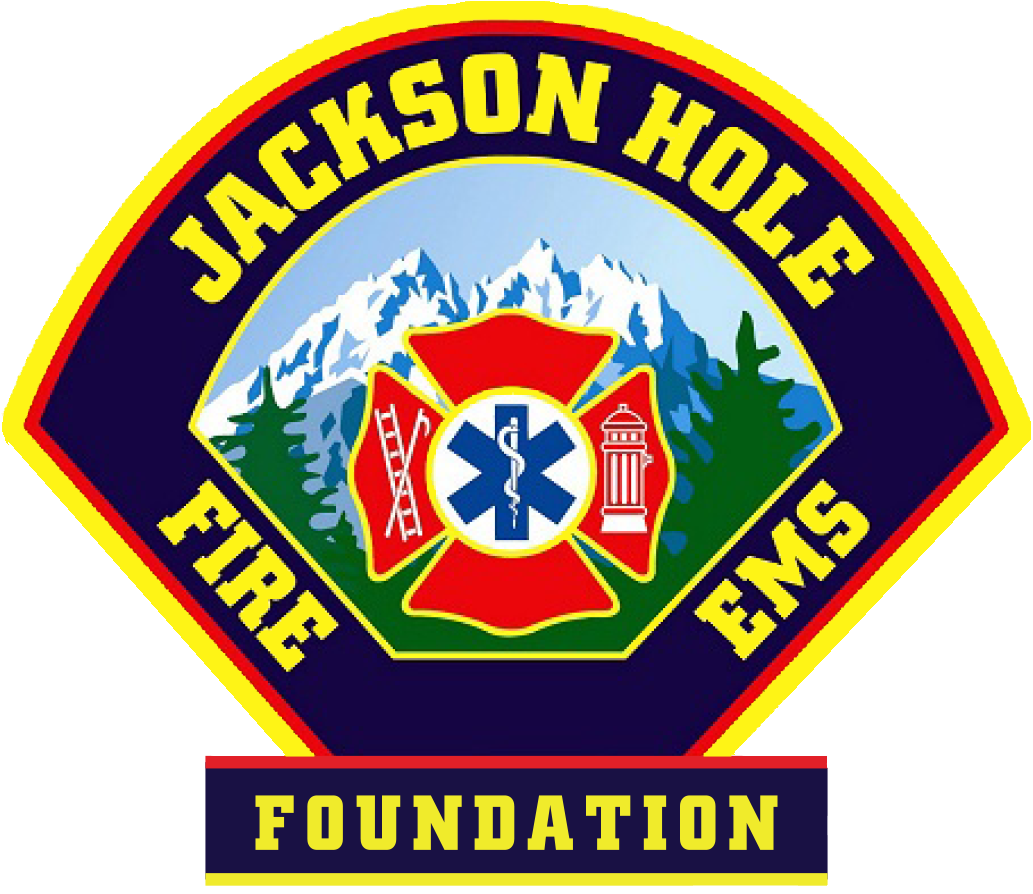
“The most satisfying and rewarding part is being able to help fulfill a need within the community.”
Dan Long
Dan Long
Volunteer Captain
2013-Present
Where are you from? I’m from Cincinnati, Ohio.
How did you find your way to Jackson? I took an internship with Alpinist Magazine after college and they hired me at the end of that internship, and I never left.
What is your role in the department? I’m a volunteer Lieutenant. I responded from Station 1 for 10 years but now respond from Station 7.
How long have you been a part of JH Fire/EMS? I was sworn in during the spring of 2014.
What made you want to join? What was your inspiration? I was looking for a way to be more involved in the community, which is kind of a boring and boilerplate answer, but I had previously held a Wilderness First Responder cert and was intrigued to do more within emergency medicine. My dad had been a volunteer EMT in the community that I grew up in from the time that I was in middle school, so he has nearly 30 years in his volunteer service. That was just a good exposure to a way that I could give back to the community. As an aside, I have an identical twin brother who is now also a volunteer EMT in the community that he lives in. My dad, my brother, and I are all involved in volunteer emergency services now.
It sounds like the medical side of things was more intriguing in the beginning, but obviously you’ve come around to fire as well. Talk to me about that. *Chuckles* Yes, the medical side was what initially intrigued me about volunteer emergency services, but I quickly became enamored with the fire side of things, both structure and wildland. I was never really someone who was particularly involved in team-based things. That may be shocking that I wasn’t particularly sportsy in life, but I think the team aspect of fire/ems really resonated with me. I definitely took a different path than what I originally thought it was going to be. I also had no and still have no aspirations towards leadership; my becoming a lieutenant was sort of sprung upon me. I was asked to apply by a former captain because he saw a need for volunteer representation in leadership roles, so that’s what led me down that path.
What are your current certs? I am an EMT basic. I am an ADO Pumper, wildland engine boss, and hazmat ops.
What are your future goals in the department? I’m recently completed my engine boss so that I help bolster our response, especially with volunteer numbers, for any sort of wildland incident. I want to help get more rigs out the door on local federal fires when the opportunity presents itself. Otherwise, I would say I’m probably not looking to expand my certifications at this time, but instead to kind of double down on mentorship within the station and to help newer members meet their goals, whether they’re career or volunteer.
What do you do for work? I work in marketing for a local real estate company.
What do you do in your free time? I live here for the climbing and I love to spend time in the mountains. That’s probably the biggest draw for me. I don’t climb as much as I want to anymore: last year was actually the first year in 16 that I haven’t gone up the Grand, which is kind of a bummer. My wife and I did a lot of 20, 25 mile thru-hikes through the various mountain ranges around here. I love being in the mountains through climbing, skiing, hunting, and rafting. Like everyone, there’s too many toys in the closet and not enough time.
What would you say is your favorite part of volunteering? Or what is the most satisfying or rewarding? I think the most satisfying and rewarding part is being able to help fulfill a need within the community, particularly when it comes to actually engaging with community members or visitors on a very personal level. I find that very rewarding. I think the department has also introduced me to a lot of members, a lot of different people within the community, and it has fostered a lot of really strong relationships for me. It has really helped me to feel truly connected to this place.
What advice would you give new recruits? I think the one that everyone’s going to say, you know, the old ‘it’s a marathon not a sprint’ metaphor. It’s very easy to let the department and the excitement really take hold of your life, and we want to make sure that people are sticking around for the long term so they have well-rounded personal lives and opportunities outside of the department as well. I’d recommend that folks pick one or two disciplines that really excite them within our multi-hazard response and become incredibly proficient in those and then to use that passion and knowledge to help educate and shape the future generations of responders.
What do you wish you had known when starting? I would say that communication is key, whether that’s with friends or family or partners about the commitment and involvement with the department. It’s also hugely important to be talking candidly with your peers and supporting each other through difficult calls, difficult situations and recognizing that you’re going to be sharing a lot of your life with these people. It’s making sure that you have the time and energy to support your own personal wellbeing as well as that of your peers. In terms of a broad stroke answer, I would say that it’s important to be looking out for our own personal and mental wellbeing to help enable us to be better responders in the day-to-day.
How do you manage that dynamic in your own life with friends and family and being on call, etc.? A lot of my friends and family have come to expect a high level of commitment from me in most aspects of my life, and they know how important service to the department is. Occasionally I have to set aside chunks of time in my life to prioritize family and friends and block out times that I’m personally not available. It’s also important to have check-ins, especially with family or partners because they need to have buy-in to the responsibilities of sharing a life with a volunteer or career first responder. Really, it’s just having proactive communication with those people and making sure that they’re supported too; they’re making sacrifices in their lives based on our availability as well.
What would you say is the most important skill or trait for someone to have on the department? I think an eagerness to learn coupled with a healthy dose of humility, and a willingness to try new things. I think first and foremost it’s that desire to always be a student, to always be learning.
What do you think you bring to the department? A strong desire to get the job done and to have a very behind-the-scenes work ethic. For what it’s worth, I see myself as a backseat firefighter more than a leader, but I don’t have a lot of opportunities to do that anymore.
Who is your mentor/who do you look up to? My personal mentor when I joined the department as a probationary member was a career captain who is no longer on the department who invested a lot of time and energy into myself and others in my recruit class. That was James Powell, who’s a retired captain. He really did a lot to shape who I became within the department and I think he really set expectations within me for what a volunteer should look like in the department from a performance standard, a commitment standard, an involvement standard, and really did a great job in helping me to see the big picture of my involvement in the department.
